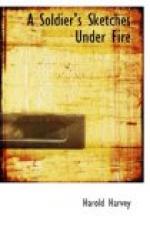[Illustration: A violated Convent.]
The enemy had abstained from destroying the building, probably from a subtle motive. They had retired to a wood in the rear. We made a sharp attack upon them to the right of this wood the next day; caught them at night completely unawares, and, after a very stiff fight, routed them, and they left 150 dead on the ground.
There was a pond in the Convent grounds, and while getting water for our transport teams we came across some tin cases hidden away by the enemy—a great find, for on getting them out we found they contained many thousands of rounds of the enemy’s ammunition. It was perfectly dry, as the cases were watertight; so we made a big haul of most useful supplies.
CHAPTER X.
Another scene of Boche brutality.
The accompanying sketch is of the Market Square of Armentieres, the building shown in the centre being the Town Hall. The cobble stones of the roadway and the lattice-shuttered windows are of the style which has lasted for generations. This quaint and picturesque town was devastated and almost totally destroyed; in fact, the bit of it I show was the only portion the enemy left uninjured. We captured the place, taking four machine guns, several horses, a quantity of equipment and ammunition. Two of the machine guns were mounted in the clock tower, a position commanding the range of the street. It is revolting to recall the stories we were told here, and carefully verified, of the shameless atrocities of the Huns. The populace were still in occupation of the buildings when we were driving the Germans back from the barricades. Of course they were greatly terrified, and we did our best to pacify them and soothe their nerves as we came in contact with them. How different was the treatment they received from the enemy. Take the house on the left of the picture. Here Germans walked their horses through the door shown, along the passage into the yard in the rear, as a mere piece of bravado—an incident scarcely worth mentioning in view of the crimes they proceeded to commit. The householder, with his wife and two daughters, was sitting eating his dinner when the party arrived. The cowardly brutes shot this man on sight—in full view of his family—carried his body out and later on buried it in the chicken run. Meanwhile, they came back and ate the dinner. The various members of the family were tied up to beds and subjected to the grossest of infamies and greatest of cruelties.
[Illustration: Where Germans raped and murdered.]
I repeat that we verified the stories of these horrors, as we had verified elsewhere other such stories before, and as we verified elsewhere other such stories afterwards.
Naturally, our men fought their hardest, and by four o’clock in the afternoon of the day we advanced we drove the Boches at the point of the bayonet.




